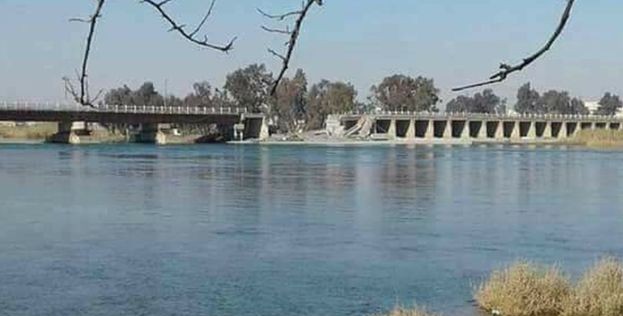PHOTO: One of four bridges damaged by US-led airstrikes near Raqqa
LATEST
The city of Raqqa in northern Syria — the Islamic State’s central position in the country — is without drinking water and cut off after US-led airstrikes, according to activists.
Reports say coalition attacks affected the main water supply to the city and its suburbs. Four bridges have been damaged.
However, the group Raqqa is Being Slaughtered Silently said the Islamic State had repaired a pipeline on Friday, restoring some supply.
The attacks follow an announcement by the Kurdish-led Syrian Democratic Forces that they will renew the attempt to take Raqqa, held by ISIS since late 2013 after it pushed out rebels. The city had a recorded population of about 220,000 before the Syrian uprising began in 2011.
The SDF, supported by the US with special forces and weapons as well as airstrikes, announced its offensive in early November. However, the advance has been held up not only by Islamic State resistance but by political considerations.
Turkey objects to any further move by the SDF, which has pushed back ISIS in northeastern Syria since late 2015. Ankara believes the leading faction, the YPG militia of the Kurdish Democratic Union Party (PYD), is part of the Turkish insurgency PKK.
The US has said that the attacks are being carried out by Arab components of the SDF. Earlier this week, Ahmed Jarba — a politician who once was President of the opposition Syrian National Coalition — said that he is raising a force of 3,000 Arab men for the push into Raqqa.
The Washington Post had reported on Thursday that the Trump Presidency had scuttled plans for the offensvie by the Obama Administration, prepared for more than seven months, deeming them “wholly insufficient”.
A “senior Trump Administration official” said, “They provided the information, but we found huge gaps in it. It was poor staff work.”
Turkey Meets Syrian Opposition in Preparation for Political Talks
Preparing for the next round of political talks over Syria’s crisis, the opposition has met a Turkish official in Ankara.
Riad Hijab, the general coordinator of the High Negotiations Committee; Anas al-Abdah, the President of the Syrian National Council, and rebel representatives were hosted by Turkish Foreign Ministry Undersecretary Ümit Yalçın. Officials of the Syrian Kurdish National Council — preferred by Ankara over the Syrian Kurdish Democratic Union Party (PYD) — and the Syrian Turkmen community are also expected to join meetings.
Russia, an essential backer of the Assad regime, and Turkey brokered the renewal of political talks in January in the Kazakhstan capital Astana. The opposition-rebel bloc called for a ceasefire, release of detainees, and an end to sieges before proceeding with arrangements for a political transition.
However, the head of the regime delegation, Bashar al-Ja’afari, questioned the legitimacy of the bloc, calling it “terrorist”.
The next negotiations are scheduled for February 20 in Geneva.

